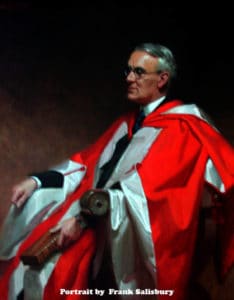Scrapbook of Rev. Sidney Malcolm and Helen Alice Berry née Logan


The provisional clauses of the Declaration of the Rights of Man, drawn up by Mr. H. G. Wells, are:—
No man shall be subjected to mutilation except with his own consent, freely given, nor to bodily assault, nor to torture or beating; he shall not be imprisoned in such conditions as to cause acute mental disturbance or illness through disease. The extreme punishment to which the law can subject him shall be rigorous imprisonment for not longer than fifteen years or death.
No man shall be imprisoned without being charged within a specified period with a definite offence under the law nor for longer than three months without a fair trial in open court; failing such trial he shall be released. The only exception to this rule shall be where a man is certified by a competent authority to be a danger to himself and others through mental abnormality, and even in such case, the certification must be annually confirmed.
No man shall be penalised, whether by imprisonment or deportation, on the evidence of secret dossiers unconfirmed in open court. A dossier shall be used only as a memorandum for administrative purposes and the substantial facts in it shall be accessible to the man concerned and subject to verification or correction at his challenge.
All men without distinction of race, colour, creed or political opinion, shall be held to be joint-heirs to the resources, powers, inventions, accumulated by our forerunners and shall be entitled to such nourishment, housing, covering and medical care as shall enable them to realise their full possibilities of physical and mental development, to the joint benefit of mankind.
Every man shall have as an unalienable right the utmost freedom of discussion, of worship and of free association in such political trades-union; professional or other organisations as he desires. There shall from childhood be made available to him sufficient education to make him a useful and interested citizen and to enable him to develop distinctive gifts in the service of mankind.
Every man shall have the right to engage freely in any lawful occupation earning such pay as the need for his work and the contribution it makes to the common welfare shall justify. He shall be entitled to a free choice wherever there is a variety of employment open to him.
Every man shall have the right to buy and sell without discriminatory restrictions anything that may be lawfully bought or sold subject only to such reservations regarding quantities as are necessary to the common welfare.
The personal property of all men lawfully acquired, including a man's private house, apartment and reasonably limited garden enclosure, shall be entitled to the protection of the law, and of the police as agents of the law against private violence, deprivation or intimidation.
All men shall have the right to move freely about the world at their own expense, to come and go over moorland and mountain, upon the seas and lakes and rivers of the world subject only to restriction where free access would be destructive of some special use or would be of danger to others.
The principles embodied in this declaration shall be legally defined in a code of fundamental human rights accessible to all. These principles shall not be set aside by any secret treaty or Order-in-Council: no administration under the pretext of urgency shall have power to infringe, by administrative order the rights and liberties here asserted. They can be amended only by free public debate and on the decision of a majority vote.
The declaration concludes:— There is no source of law but the whole people. Life flows on. No generation of the people can surrender the legislative power unalienably inherent in mankind. The rights here set down are fundamental and shall endure.

